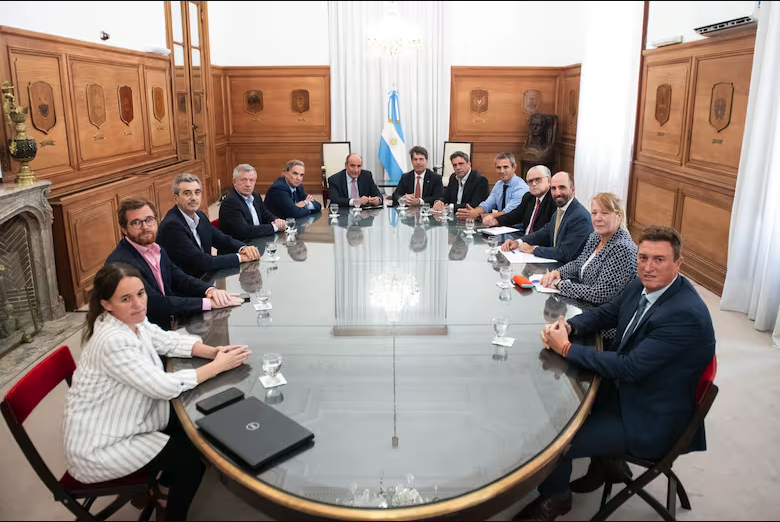
Published 04/09/2024 18:20 | Edited 04/09/2024 18:35
In the next few hours, the political corridors will be abuzz with the decisions of the Argentine Executive, which will determine the project of the much-discussed mega-law and the fiscal package. The goal is to ensure provincial leaders and legislators are aligned before discussions begin in Lower House committees next week. Among the planned measures, the restoration of Income Tax with new parameters stands out, while the opposition is pressing for the inclusion of a labor reform.
Unlike what happened in January, when Javier Milei’s government sent a set of proposals without due prior consensus, this time, the aim is to reach the parliamentary debate with the agreements already established. “We sent these last drafts as a final check, to confirm that we are all on the same page,” said an official contributor.
The Chief of Staff has been working hard to polish the texts, ensuring they are ready to be sent to all political parties. In the case of the “Bases” law, the government chose to send only the text of a revised opinion, with a third of the articles, so that the committee plenary can replace the original opinion, significantly speeding up the legislative processes.
The Minister of the Interior, Guillermo Francos, and the Chief of Staff, Nicolás Posse, led a meeting at the Casa Rosada with deputies from different blocs, including the Fazemos a Coalizão Federal and a radicalism faction. During the meeting, it was announced that the final draft of the new Basic Law and the fiscal pact will be sent to Congress possibly this Tuesday, with the official entry of the projects scheduled for April 17th.
While the final details are being adjusted, the opposition presents its main demand: the inclusion of a labor reform that addresses pending issues under Decree of Necessity and Urgency (DNU) 70/2023, which have been challenged in court. This movement highlights the complexity of political negotiations surrounding the structural reforms proposed by the government.
The tax project “Palliative and Relevant Fiscal Measures Law” also receives special attention, with the restoration of Income Tax, now called “personal income”, with new exemption floors. Singles with earnings starting from 1 million and 800 thousand pesos, and married people with 2 million and 200 thousand pesos, will be affected by these changes. The progressivity and updating of this tax will be determined by the Parliamentary Inquiry Commission (CPI), reflecting the need to adapt to constantly changing economic conditions.
Dialogue between the Executive and the different parliamentary blocs continues, with the promise of continued involvement and consultation during the legislative process. The HCF Bloc raised specific issues, including labor modernization and the moratorium with rewards for good taxpayers. Meanwhile, radicalism seeks to ensure that its concerns are addressed by presenting substantive proposals for labor reform.
Dialogue simulation
Despite Javier Milei’s recent statements, which demonstrated some political intolerance, government leaders believe that the projects will see the light of day. In recent weeks, the Minister of the Interior held meetings with various parliamentary blocs and governors, seeking support and consensus for official initiatives.
With a well-defined schedule, the expectation is that the projects will be discussed in committee next week and, subsequently, sent to the Chamber of Deputies for voting. The government expects Senate approval to occur within the first 15 days of next month.
The “May Pact” is also in the government’s plans, which seeks to reactivate the momentum demonstrated at the beginning of the administration. However, the government does not intend to include new themes in this pact and maintains a tough stance in relation to the points previously presented by Milei in Congress.
In an attempt to contain the second general strike against the government, the Minister of the Interior, Guillermo Francos, called a meeting with the CGT management at Casa Rosada for tomorrow afternoon. It will be the first official meeting between far-right authorities and trade unionists.
The meeting with Francos, which will also be attended by the new Secretary of Labor, Julio Cordero, takes place one day before the call made by the CGT to its unions for a protest scheduled for May 1st, which will consist of an act with mobilization to Plaza de Mayo. Additionally, a group of trade unionists will meet with members of the Unión por la Patria bloc of senators in an attempt to obtain legislative consensus to reject the reimposition of the fourth category of income tax.
The call for dialogue was received with caution by the CGT. “I don’t know what the interest of the appeal is, but it’s good that they agree to dialogue institutionally”, commented a CGT employee. Since the beginning of Milei’s administration, the relationship between the government and the CGT was practically broken. However, the attempt at dialogue now reflects a new approach on the part of the government, seeking to avoid social conflicts that could further harm the country’s already unstable economy.
The labor reform proposed by the government, although lighter than initially expected, still raises concerns among unions. However, the government seeks to ensure that the project does not negatively affect union funds or compromise the financing of social works. The objective is to find a balance that allows reforms to move forward without triggering a new wave of protests and strikes.
The CGT meeting with Francos takes place in a context of growing social conflict, with several professional categories dissatisfied with salary agreements and cuts in the public sector.
Source: vermelho.org.br

